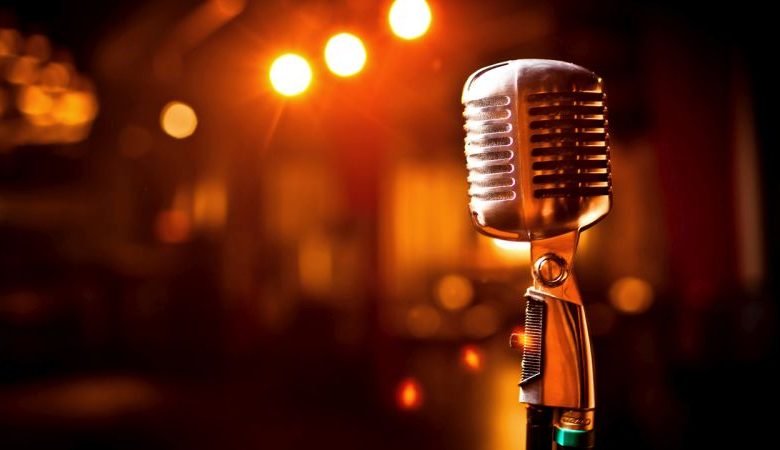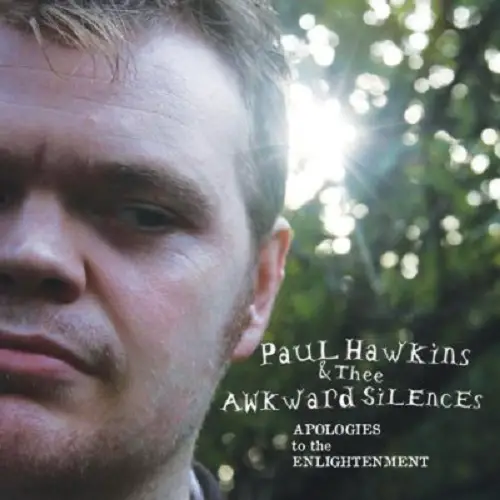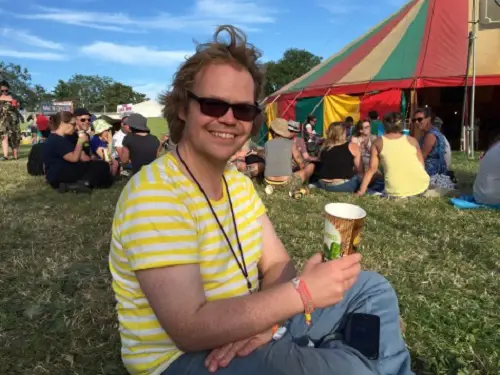
Disability and music: disabled musician Paul Hawkins in the spotlight
We’ve set music writer Meghan out to interview leading disabled musicians to find out how they got into music, how their disability affects their performances and how accessible concert venues really are. This week, she talks to disabled musician, blogger and author Paul Hawkins about his creative talents, accessible festivals and how you too can get into music…
Tell us a little about yourself and your career so far?
I’m a lead singer of Paul Hawkins & the Awkward Silences, which is an ‘outsider pop’ band from London. I’m also the author of Bad Santas & Other Creepy Christmas Characters, which is a book about the history of Santa Claus and the sinister European folktales that inspired his creation.
Added to that, I work as the Festival Project Manager for Attitude is Everything, a charity that works to make live music as accessible as possible for both deaf and other disabled people. My role there is to ensure all festivals become as accessible, and happily some are already doing it (read on below).
You’re a lecturer as well as author and musician. How did you get into all of the different lines of work?
Mostly by trying things out and seeing where they went! I did a scriptwriting degree and then a masters. After that I found myself living in London with an unfulfilling temp job and only one friend in the entire city.
So I started playing at open mic nights as a way of getting out of the house and trying to meet people. Luckily, as my songs were a bit unusual, which is probably the next best thing to being good, Ian Button (famous guitarist from Death In Vegas) began producing my music and helped me form a band.
After that, a great label called Jezus Factory offered to put our records out. From there we stumbled upon a Radio 1 session and ended up playing at Latitude festival. Since then we’ve been giggling around the place and releasing things on a couple of labels. Here are some of our latest songs…
In terms of the writing, I had an idea for a non-fiction book about Father Christmas and was basically asking for advice on Facebook about how to submit a pitch. Someone I knew through music put me in touch with an agent, who bought into the idea and persuaded Simon & Schuster to publish it.
I’d like to say it shows the value of hard work, but I can’t deny there was a lot of luck involved there too! What I would say though, is that the more you go out and meet people, the easier it is to know someone who might be able to do you a favour!
The public speaking was a natural follow on from the book. I needed to start publicising it and so it made sense to lecture on the subject and history behind the book.
As you have several different musical projects on the go, how do you go about deciding what ideas fo where?
As well as the Awkward Silences, I’m involved with two other music projects – the Count of Chateau Noir, where I do the writing, arranging and programming, and share vocals with two other singers Felix and Mary, and Bad Paul, where the music is written by a guy called Tim Ten Yen, who is one of my favourite songwriters.
There’s an element of instinct and guesswork when it comes to which idea works with which band, but broadly speaking, the Awkward Silences songs tend to be a lot more personal, whereas the Count Of Chateau Noir songs tend to be much more around folklore or stories that interest me from history.
All of my projects are a chance for me to try writing things for other people’s voices, which is really interesting as it allows me to include ideas and perspectives that might not work coming from me.
Bad Paul is an experiment in trying to write optimistic pop songs, which is pretty much the opposite of what I do, so it really appeals to me as challenge!
There are some people who believe musicians should go to school for business and possibly music production. What are your thoughts on the matter?
I think it’s about being realistic. If you’ve got infinite time and money, then I’m sure business and music production degrees are a great idea. But that might not be practical if you’re juggling music with a full time job. That said, the reality is that , certainly at the beginning , you’re going to need to manage yourself and if you see music as a ‘career’, rather than just a chance to have some fun, it’s probably a good idea to try to at least read a book or two about running a business to get a sense of the basics.
At the same time, it’s worth remembering that the time you spend reading about business is time when you’re not writing or playing music, and it’s important not to lose sight of what you’re actually trying to do in the first place.
I do however think it’s a good idea for any musician to try and get at least a bit of an understanding of music production. Firstly, it’s really helpful in terms of explaining to producers what it is you want, and secondly recording studios are damned expensive, while home equipment is pretty cheap. So if you can get to a point where you can record at home, it saves you a fortune and gives you a lot more control over the process.
In the beginning, everybody wanted to get a record deal to get their music heard, do you think it is better to be unsigned now since we have ways like Spotify, SoundCloud and YouTube for music to be heard all over the world?
It’s certainly easier for people to get their music ‘out there’ nowadays, which is brilliant for anyone, like me, who believes in a healthy DIY scene. The big challenge is then getting the music heard. Trying to keep updated on all your social media accounts and own website is a fair chunk of work and time, especially once you throw in putting together electronic press kits, arranging photoshoots and video shoots, contracting radio station blogs, booking gigs and all the things you need to do to get your music heard.
You’re also up against people who’ve got experts doing these things for them full time. In a way, I think of the days of MySpace were a golden age for musicians on the internet - you had one webpage to keep updated with gigs, photos, a bio and some music, and that was pretty much it.
Now you have the a situation where your administration skills and the amount of time you have on your hands are perhaps a bigger factor than your ideas or abilities as a musician. I think this is unhealthy for music in general and also creates a real barrier for many people towards becoming musicians. For all the good the internet does, that is a real problem.
However the flipside is that although I am in small London band, people from around the world can hear my music. I know we have fans in Estonia, France, Germany, Sri Lanka, Ukraine, and the US, and that’s pretty cool!
What music festival would you say is the best in the UK?
It very much depends on what you’re after. Glastonbury is an utterly incredible experience that’s unlike anything else in the world. Latitude has a similar combination of bands, mixed with theatre and arts, but in a smaller setting, which might work for people who find Glastonbury a bit overwhelming.
I went to Festival Number 6 last year, which had loads of fantastic acts, It was also in the lovely setting of Portmeirion, a Roman-style village in North Wales where the 1960s TV show the Prisoner was filmed. It also has a more plumbed in toilets than most outdoor festivals, which makes it great for my own disability.
There are loads of brilliant smaller festivals. Just So Festival is a great kids’ festival, Deershed is family friendly but with plenty for adults too, and then there are festivals such as Village Green, Nozstock and 2000 Trees, which are run by fantastic people who just want audiences to come and enjoy themselves.
I’m going to both End Of The Road and Bestival for the first time this year and I’m really excited about that too!
If you’re interested in any of these festivals, click on the links above. Also check out our article on the top 5 accessible festivals 2016.
What changes do you think need to be done to make these venues and festivals more accessible?
Attitude is Everything works with the music industry to make venues and festivals as accessible as possible for disabled people and I manage the festival side, working with the festivals I’ve mentioned above, and many more besides.
The first thing I’d say is that we increasingly find festivals in the UK are committed to improving their access. If I was going to quickly list five cost-free changes I think all festival could make I’d say:
1. Have an access information page on festival websites giving clear information about how accessible the festival is.
2. Have a dedicated person responsible for access, both before and during the festival.
3. Offer a PA ticket, free of charge, to any customers who need it.
4. Rather than selling a limited number of ‘disabled tickets’, instead allow customers to buy a general ticket and then book their access after doing so. Also, allow people to pre-book accessible parking, access to the accessible campsite and any viewing platforms or areas.
5. Ensure all stewards have basic disability awareness training and are informed about the facilities the festival has for disabled people.
If you do know someone who runs a festival, I’m more than happy to meet with them to have a detailed chat about how we can support the festival to improve its access.
Do you have any advice for people with any disability that want to become a musician?
The first thing I’d say is: take the plunge. Learn an instrument and start playing. It might be a case of working out which instrument is right for you, and it might take a bit of trial and error to find the best way to learn it. When I first tried to learn the guitar at school, I found it impossible because of the way my impairment affects my fine motor coordination.
However, a friend recommended a guitar teacher to me who, instead of focusing on the difficulties I had from learning the guitar in a conventional way, spotted some unusual techniques that I had adopted to compensate and helped me to learn to play the guitar in my own way. Now I struggle to do certain things that most guitarists would regard as pretty basic skills, barre chords for example, but I have also written certain songs that guitarists struggle to learn because the way I play is counter-intuitive to conventional guitarists.
Given how many bands and how many musicians are out there, your impairment can sometimes give you a real edge as a musician, as the solutions you adopt to overcome the challenges you face, mean you do things other musicians would never think about! Similarly, I think many disabled people will have had life experiences that are unique or unusual and that could potentially mean you’ve got material for songs that could make you stand out too.
If you find conventional instruments are not easy or possible for you to play, it’s worth getting in touch with a charity such as Drake Music, which specialises in helping disabled people play, who might be able to advise you on accessible instruments and technology that could help you make music.
Once you’ve got a few songs, if there’s a venue or pub near you that’s accessible and offers an open mic nights or small gigs, get down there and start playing your songs in public. If it doesn’t have open mic nights, find a pub that’s accessible and ask if you can help them put some nights on!
You could also look to get some basic recording software cheaply, record the songs at home and put them on the internet. Start talking to other musicians too who are doing things you like, build relationships with them and working together to promote what you’re doing. With any luck, you’ll start to build a reputation and you might find other musicians you want to start a band with.
The last thing I’d say is, if you are or want to be a musician and are based in or around London, do feel free to get in touch with me. I run a monthly night called Outsider Pop and, if that title sounds relevant to the sort of music you make, I might be able to offer you a gig! I’m also more than happy to offer advice wherever I can.
Lastly, do you have any goals for the last few months of 2016?
We’ll do a few more Outsider Pop nights and then I want to look at getting some funding to put on a few ambitious ideas I have up my sleeve. We already caption all of our own lyrics and offer other bands the means to caption theirs too so they’re more accessible. I also really want to push the ways in which we can make the nights more accessible and entertaining. We’re aiming to do some new recordings, finishing a music video and getting ready to apply for as many festivals as possible in 2017!
To find out more about Paul Hawkins and to contact him, visit his website, and to download his music go to Paul Hawkins & The Awkward silences website.
By Meghan
You can read more of Meghan’s articles by visiting her blog, Got Meghan’s Blog.
Check out…

